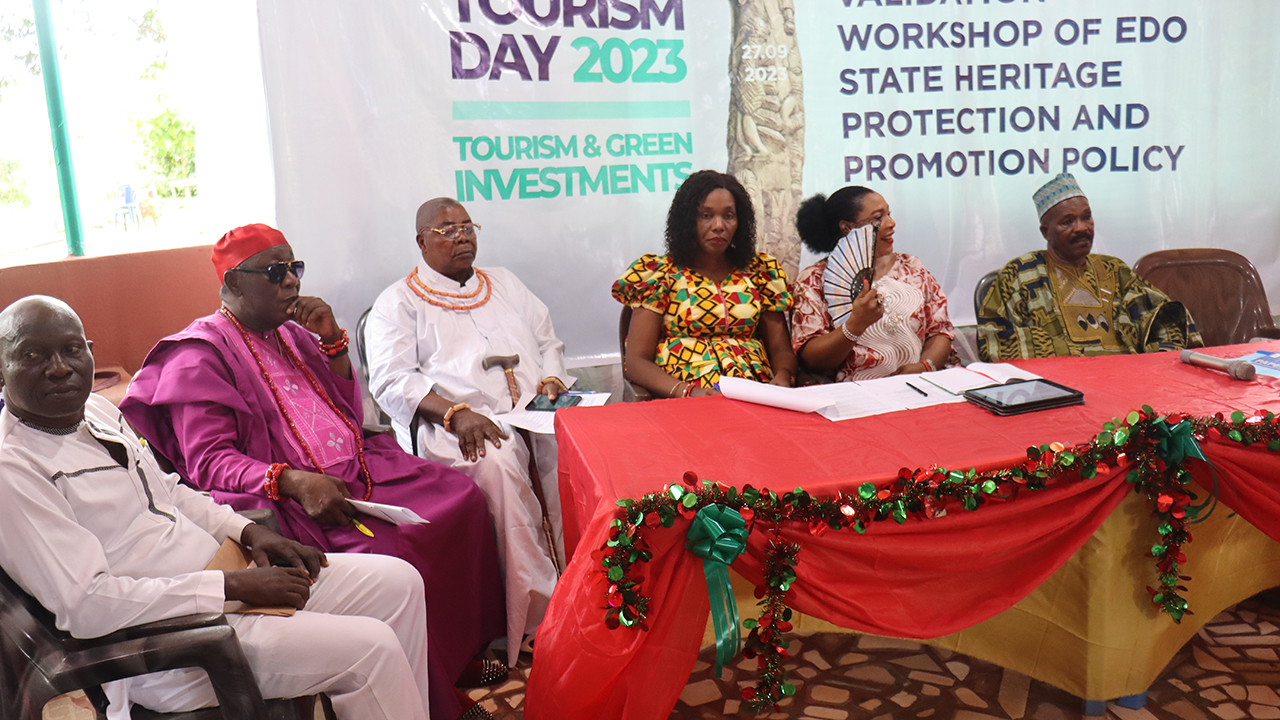
Stakeholders from the culture, creative industries (CCIs) recently converged on Ogba Zoological Garden for a Stakeholders Validation Workshop, which aimed to provide Edo State with a heritage protection and promotion policy draft.
The event also coincided with the celebration of 2023 World Tourism Day (WTD). Attended by industry stakeholders representing a broad spectrum of interests including, traditional rulers and chiefs, scholars, artisans, entertainers and government officials, the workshop underscored the policy’s far-reaching implications.
The participants engaged in meaningful discussions on the draft heritage policy, emphasising its importance and potential socio-economic benefits in protecting heritage sites, monuments and traditions, and helping them to become drivers of growth and employment.
Highlighting the need for holistic involvement, Edo State Commissioner for Tourism, Arts and Culture, Dr. Uyi Oduwa-Malaka, noted the state government has assembled a strong and diverse team, spanning various sectors of the economy, to develop a comprehensive policy.
She stated that her Ministry is working in close collaboration with relevant stakeholders across the state to guarantee the long-term effectiveness of the policy.
The Permanent Secretary of the Ministry, Iryn Omorogiuwa, also highlighted the historical significance of the policy. She said: “It is very important that we keep our history, our stories and not let people tell us otherwise. For the first time in history, we are going to have a document that focuses on us, our cultural and traditional heritage, our tangible and intangible assets.”
The workshop shed light on the significance of preserving culture in Edo State. Using the Benin moats as a prime example of a heritage asset in dire need of intervention, Prince Patrick Oronsaye, an art historian, stressed the critical nature of the policy, stating: ‘‘The greatest damage we suffered here is the moat, 16,000km put together in a period of almost 500 years, 37 million metric tons of earth, was moved in the creation, 150,000 man-hour resulted in the Benin City moat, it took us 30 years to destroy it. We are talking about protecting what is left, from palaces, to shrines to grooves.”
Stakeholders at the workshop also expressed their conviction that the heritage policy will play a pivotal role in safeguarding Edo culture, as well as tangible and intangible assets from further deterioration.
Renowned Nigerian musician and convener of the Benin Bronze Festival, Eno Louis, called for a collaborative approach to sponsorship, stressing that the ministry should aim to create an enabling environment for businesses within the CCIs to thrive in the state.
Another participant, Aiko Obobaifo of the Institute of Benin Studies, echoed the global significance of the policy, stating, “every blackman in the world is waiting for Edo, for Benin to lead the way. Our heritage is something they cannot replicate.”
Other stakeholders, including Mrs. Elizabeth Hannisdal from Visit Edo and Mr. John O. Igbineweka from Igbesanmwan Guild Carvers, expressed their optimism for a comprehensive heritage policy and its potential to enrich the lives of Edo people.
The Edo State Heritage Protection and Promotion Policy represents an ambitious endeavour to preserve, protect and celebrate Edo State’s cultural heritage. The collaborative spirit of the workshop portends well for the policy’s successful implementation.






